Month 6:18, Week 3:3 (Yom Shanee/Matzah), Year:Day 5949:165 AM
2Exodus 6/40
Gregorian Calendar: Sunday 18 August 2019
New Testament Studies
The Complete Messianic Evangelical
New Testament Phronema Study Series
2. Introducing the Gospel of Mark
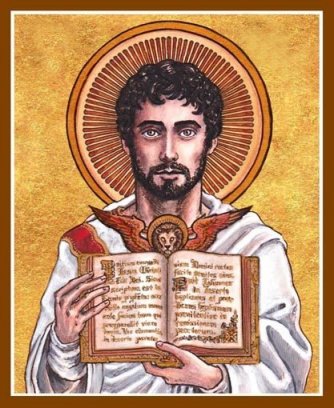
Continued from Part 1 (General Introduction)
Introduction
 Welcome to our new regular weekly New Testament Phronema Bible Studies series in which we shall be working systematically through the Messianic Scriptures or New Testament over the next year or two, or maybe even longer. If you weren't here with us 10 days ago when I introduced this course and its goals, you will need to go back and read or listen to that material. This is not going to be your typical Protestant Sunday School or Messianic Saturday Sabbath School Bible Study that seeks to vindicate a particular denominational position doctrinally.
Welcome to our new regular weekly New Testament Phronema Bible Studies series in which we shall be working systematically through the Messianic Scriptures or New Testament over the next year or two, or maybe even longer. If you weren't here with us 10 days ago when I introduced this course and its goals, you will need to go back and read or listen to that material. This is not going to be your typical Protestant Sunday School or Messianic Saturday Sabbath School Bible Study that seeks to vindicate a particular denominational position doctrinally.
Time for a New Review
For ourselves, we have been developping doctrinally now for over 30 years and as you know every seven or so years we have a big review just to make sure we haven't 'lost our way' in any important areas. And in view of the big changes of late, we have decided to go right back to the beginning and to reconstruct the first century Messianic Community based on the latest research into linguistics, theology, history, and so forth. We have never attempted anything this big before. Then we will see what lines up with the revelations we have received and what, if anything, does not.
The Two Main Tasks of Critical Realism
We have two main overall tasks. First, we must obey the instruction of Yahweh to Jeremiah, something I think we have been pretty faithful to over the last 30 years or so:
"Stand at the crossroads and look;
ask for the ancient paths,
ask where the good way is, and walk in it,
and you will find rest for your souls" (Jer.6:16, NIV).
And second, we must constantly evaluate the cultural lenses through which we view Scripture because every age has a different persective, looking at the world from various angles, building upon previously made historical assumptions and making new ones. In other words, you have to have an overall philosophy that provides a framework within which you map out existence and I will state right up front that mine is New Testament theological Critical Realism as defined by N.T.Wright [1], what some have called a 'hermeneutic of love'.
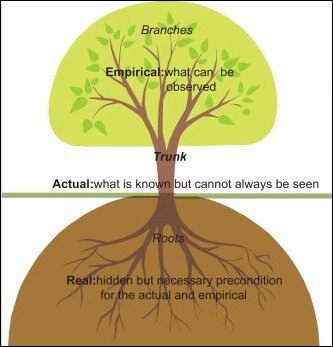 There is always a lot more beneath the
There is always a lot more beneath the
surface of Scripture than at first realised
Dealing With Both Objective and Subjective Reality
Put simply, this is a way of describing the 'process of knowing' and what it does is acknowledges the reality of the thing known as something other than the knower ('realism') whilst at the same time acknowledging that the only access we have to this reality is through a dialogue or conversation between the knower and the known ('critical'). In other words, it acknowledges both the objective and subjective nature of reality, and in our situation here, of the events described in the New Testament.
Examples of the Application of Critical Realism to Theology
So for example, critical realism acknowledges the physical reality of the resurrection (so that you can't, like liberals, just reduce it to some mere 'symbol' of something solely going on inside you) whilst acknowledging that it is experienced differently by people depending on a whole range of factors. Do people get supernaturally born-again by the Ruach (Spirit)? Absolutely. Do we all experience this in exactly the same way? No, we don't, which means we don't all have to do 'one thing' like 'speak in tongues', get instant healing, or whatever. That's what 'critical realism' will do and I absolutely believe it's the way Yahweh wants us to view things. It means that in some areas of the Gospel message we can, and must, be strict and dogmatic, but in others, we cannot, and absolutely must not, be so. Thus we can be both rigid and tolerant without falling into the various artificial category traps created by denominationalism which leads to the kind of fragmentation of the Body of which Protestantism is guilty. Hopefully this will become clearer as we look at tons of examples in the text over the months ahead.
Apparent Contradictions
We can also use this method to resolve apparent contradictions in Scripture. An example would be, on the one hand, the apostolic injunction to obey Elohim (God) before man (Ac.5:29) and, on the other hand, Paul's command that we should be subject to the civil authorities (Tit.3:1). Another would be Yah'shua's (Jesus') command to the leper in Mark 1:43-44, which we'll be confronting next week, to keep his healing completely secret, except to the local cohen (priest), whereas elsewhere He insists that He has been completely open about everything, doing nothing in secret, implying we should do the same (Jn.18:20). In other words, sometimes we are to be secret and at other times open because there are intelligent, spiritual reasons for both at different times in different situations. Thus Critical Realism will provide an honest intellectial approach to our studies. It's our over-simplications that tend to create the illusion of contradiction and so create unnecessary tensions and dilemmas both inside the Body of Christ and outside it. I want us to be able to walk away from this series with clear, uncluttered minds. We'll be able to put this straight away to the test in this study of the Gospel of Mark.
Between Two Poles
But brain-storming alone, important though it is, isn't going to get you very far if that is going to be your sole way of viewing reality, because there is also another reality - another dimension, if you will - that has an intelligence and reason all of its alone, just like the world of the heart and emotions. I am speaking of the world of the spirit. And here we can, if we aren't very careful, get outrageously subjective leading to further divisions. So what we need is a synthesis between the two and that is what leads to what is called the phronema, which is why we are calling this the New Testament Phronema Study Series. What we're going to be doing is going a long way, I hope, to reconcile the polarities that we find in the Body of Christ as, for example, between the Baptists (who are very Scripture-intellect oriented) and the Pentecostals (who are far more emotion- and spirit-driven), with the Calvinist cult at one extreme and the Charismatic cult at the other. We have exactly the same kind of problem in the Evangelical - Messianic split which is caused by two extremes.
 Extremism: Calvinists vs. Charismatics or Evangelicals vs. Messianics
Extremism: Calvinists vs. Charismatics or Evangelicals vs. Messianics
Fossilised Theological Schemes
Getting the doctrine 100 per cent correct, or having a system of theology that is 100 per cent spot on, though, isn't necessarily going to get you to the phronema or 'spirit' of the authentic Messianic Community (Church), and it certainly won't help us discover and connect to what happened in the first 20 years of the young Messianic Community (Church). The great Protestant theological schemes, which are now, for the most part, highly fossilised, were formed a thousand years after these earliest events recorded in Scripture and went through a long and complex evolution in cultures both long removed from the first believers and indeed even from us half a millennium later.
Perfect Doctrine is Not Needed to Have the Messianic Phronema
By the time we have finished this long study, I hope you will realise that the Besorah (Gospel) isn't first and foremost about accepting a set of doctrinal positions intellectually. Rather, it's about becoming linked to New Creation Life in Messiah Yah'shua (Jesus) and becoming a part of an exciting and transforming spiritual dynamic or power. There was no Sola Scriptura or 'Scripture Alone' Protestant rallying cry back in those days of the 30's and 40's AD either and if there had been, the 'Scriptures' would have been exclusively the Tanakh (Old Testament) anyway because that was 'the Bible' or canon of the Messianic Community for the first three to six centuries, depending which denomination's collection you believe is the correct one.
The Muratorian Canon
There was no 'New Testament' even in the first century AD, which is the time period covered by our modern Messianic Scriptures (New Testament). Not until 180 AD do we come across the first 'list' of New Testament books, the 'Muratorian Canon' (discovered by the respected Italian historian Ludovico Antonio Muratori who published it in 1740), and even then some of the books accepted as canon by today's Protestants were missing from it (like James and 2 Peter). Nevertheless from that early canon we can learn the basic truths of orthodoxy:
- 1. Yah'shua (Jesus) is repeatedly referred to as "Master" or "Lord" (Rom.10:9; Ac.2:36; Jude 17);
- 2. Is equated with Elohim (God) (Jn.1:1-3; 20:28; Phil.2:6-8);
- 3. Took on human flesh (Jn.1:14; 1 Jn.4:2);
- 4. Died in the place of sinners (1 Cor.15:3);
- 5. Was soon raised bodily from the dead (Lk.24:36-40; Ac.1:3; 2:24-35; 1 Cor.15:4); and
- 6. Testified that a person can only find forgiveness through faith in Him (Jn.6:47; Ac.13:38-39; Gal.2:15-16).
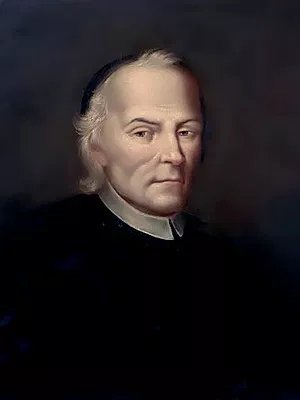 Ludovico Antonio Muratori
Ludovico Antonio Muratori
Ownership of 'Bibles' Rare
But that basic Christian doctrine, to which we can all say a hearty 'Amen!', which represents a clear, well developped theology, was not so well understood or in any great depth in the pre-written New Testament period up to the early 50's which is where we must start today. People didn't even own 'Bibles' in those days because they couldn't possibly afford to own Tanakh scrolls unless they were very wealthy indeed and had the money to get a scribe to laboriously copy one, and even then it would have taken a single copyist many months to complete the job. There were no 'stores' selling Torah scrolls, and usually only kings and priests or (later) rabbis and their synagogues owned them. The idea of 'Sola Scriptura' is, in any case, a modern idea stemming from the Reformation which was launched by Martin Luther in 1517, a mere 500 years or so ago.
No Sola Scriptura for a Thousand Years
No one had ever gone around crying in Latin, 'Sola Scriptura! Sola Scriptura!', in any language before then. The reason they did that was solely in reaction to the corruption of the Roman Catholic system. We can't go into the Reformation today as that is quite complicated and has so many branches, and will only distort the simple Bible message that we want to get our hands on. That's for much later.
Our New Watch Cry - 'The Phronema of Messiah!'
So what would the 'spiritual rallying cry' of the first believers have been? Without any doubt whatsoever in my view (because there really is no other alternative) it would have been something like, 'the Phronema (mind) of the Messiah which is the Phronema (mind) of the Messianic Community' though there probably wouldn't have been a 'verbal cry' per se - remember, there was no proper 'theology' before Paul even though he was active as a convert quite soon after the Ascension, probably within three to five years at the most. The complicated stuff in his epistles, that has caused so much controversy, came about only after years of deep meditation, prayer and experience with apostacising congregations such as the real thorn-in-his-side at Corinth but also elsewhere such as in Galatia.
The 'Word of Mouth' Gospel
So, yes, there were apostles around (though they weren't everywhere, nor could they get anywhere quickly because there were no planes, trains, cars, or high-speed transport generally, even though there were good Roman roads, and there were no telephones or internet in those days either). As we understood last time, for the first 20 years after Yah'shua's (Jesus') departure there were no written gospels or letters being circulated that we know of, and if there were, they never made it to the New Testament. Everything was oral or by 'word of mouth'. The written stuff had to wait until the 50's which is yet far ahead on our timescale for this early part of the Study Series. We're starting in the first 20 years when the only witness was the occasional, through rare, visit by apostles, and sometimes short visits by evangelists, so the most important thing in those days was the active presence or parousia of the Ruach haQodesh (Holy Spirit) which birthed the Messianic Phronema. People didn't carry Bibles or Tanakh Scrolls around under their arms or in their bags as we do, nor did they until way after Gutenberg's invention of the printing press and the first printed Vulgate (Latin) Bible of the 1540's, some 1,500 years later, and even then such expensive luxuries were not available to the masses.
A Different Kind of Witnessing
It's going to be challenging for us to put ourselves in the shoes of the believers of the first two decades because we're so used to whipping out our Bibles and starting there, but it's most essential that we do so, so that we understand upon what early Christianity or Messianism was built, and what gave the community of believers their life and identity. The main witness was through the ancient art-form of 'story telling' comitted to memory, and direct heart-to-heart engagement based on experience. The only Scriptures that the first believers ever quoted were from the Tanakh (Old Testament) and they used these to prove that Yah'shua (Jesus) was the Messiah (Christ) to vindicate their witness that He had risen from the dead and had empowered His people supernatually. That was the substance and force of their witness and mostly it was geared to fellow Yehudi or Judahites ('Jews'). They weren't talking about the metaphysics of grace, justification, sanctification, hellfire, and all the other stuff you typically hear in Protestant Churches because nobody had written about it yet! But there was plenty of resurrection talk because it was the doctrine of the faith!
Bible Versions We Shall Be Mostly Using
So let's get started with the Gospel of Mark, as promised last week! You have all, I hope, read the first couple of chapters (though we may only get through one today, or maybe only a few verses of it), and for those of you who are new here, we are using as our primary translations [2] the New King James Version (NKJV) together with either the Halleluyah Scriptures (HS 2015 or 6th edition) or The Scriptures (Institute for Scripture Research, ISRV 2009 edition) [3] which everyone in MLT owns so that there is a nice Protestant-Messianic mix. I myself will be using a number of others too, principally the New Revised Standard Version (NRSV) and (at least in these meetings) N.T.Wright's Kingdom New Testament (KNT).
Mark, a Hard-Punching Gospel for Our Busy Generation
So here's my first statement in our study: The Gospel of Mark is the ideal Gospel for this generation! His account of the life of Christ is full of fast-moving action! And that's why some call this the 'Gospel of Action'! If you're a 'go-and-do-it' kind of person, this Gospel will really appeal to you. If you're the kind of no-nonsense person who thinks and acts, 'How fast can we do this? How soon can we get this task done? And how can we keep things moving?' then Mark will definitely appeal to you - Mark's your man! Today's world, especially in the cities, is fast-paced and this will give you a clue as to whom, and for whom, Mark wrote this account, almost certainly the first chronologically of the written Gospels. But equally, this Gospel reflects the character of the man who inspired the material that John Mark weaved together - the apostle Peter - for as we have discussed before, there is a very high probability that Mark has recorded the preaching notes of Peter, whom he accompanied in these early days in the 30's and 40's, and has himself woven this hard-punching narrative together.
 John Mark taking notes from the apostle Peter (Kefa)
John Mark taking notes from the apostle Peter (Kefa)
No Genealogy in Mark
As you will have noticed already, there is no genealogy in Mark's Gospel - no list of Yah'shua's (Jesus') ancestors back through King David and farther to Abraham. And that is because Mark primarily wrote for Roman believers who wouldn't have been interested in Israelite genealogies. Understanding why a Gospel includes 'this' but not 'that' is extremely important. If I were to arrive in a country which had never heard of the Bible, for whom 'Old Testament' or 'Israelite' would have absolutely no meaning, starting my evangelising with a long genealogy would not only have been uninteresting but meaningless to my listeners or readers. The 'first impact' and therefore 'first impression' is very important when you're witnessing to the unsaved otherwise people stop listening or put the book down. That's just human nature. Now had my target audience been Jews, then something 'Jewish' would be appropriate to garner interest - to capture attention. And that's why, as we'll see later, Matthew began his Gospel with a long genealogy - his audience consisted of Yehudi or Judahites for whom genealogies were very important indeed (Tit.3:9)! So it makes perfect sense that the two apostles should start their Gospels differently. Likewise, as we'll later see, John doesn't begin his Gospel with a genealogy either because his audience, though different to Mark's, is likewise non-Israelite. And although it's addressed to pagans too, it's written for a particular kind of pagan, religious pagans called Gnostics who were corrupting the Besorah (Gospel).
Things That Interested Romans
So Mark was writing to your run-of-the-mill Roman-off-the-street with the typical Roman mindset of the day. The Romans were very much people of action rather than of doctrine or theology. That's why they had such a huge Empire. They loved conquest, law, and administration, which we in the West have picked up too. What would have interested a typical Roman of the 1st century AD? 'What did this fellow Yah'shua (Jesus) do?' would have been uppermost in their minds had their curiosity been piqued. 'And what can He do for me?' would have been the question of the serious Roman investigator. And for the Roman convert and disciple, the next question would logically have been, 'What can I do for Yah'shua (Jesus)?' Understand the world and mindset of the Romans and you will understand the Gospel of Mark easily, and why it excludes so much that the other Synoptists - Matthew and Luke - included in their versions of the life of Christ.
The Servant Who Wasn't a Mere Man
So, true to Roman preferences, the Gospel of Mark is full of miracles and action stories, just the sort of thing your secularised, post-Christian Westerner might be interested in today. Look at all the action movies people like. But these weren't any old stories of those particular genres. The Greek and Romans had plenty of 'action stories' of their own in their pagan literature going back centuries, myths and exploits of the gods and their offspring. No, the miracles and action stories Mark records had a specific purpose, namely, to prove beyond a shadow of a doubt that though Yah'shua (Jesus) was a servant, he was not a mere man. Only Deity could do such things. And you'll have noticed that the very first verse reads in most translations:
"The beginning of the gospel (besorah, good news) of Yah'shua the Messiah (Jesus Christ), the Son of Elohim (God)" (Mark 1:1, NKJV).
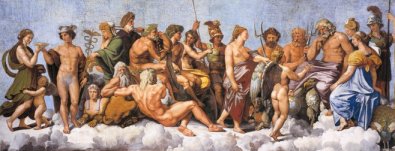 The numerous gods of Rome and their offspring
The numerous gods of Rome and their offspring
Zeus' Sons and the Divine Son of Yahweh
Wham! First line, first punch, just the sort of thing that would have made a Roman audience sit up and take notice: "Son of God"! Wow, really? And then in their minds, being pagans, they would have recalled Zeus had sons (dozens, in fact)...and their interest would have been piqued that way. You think?
Not an Appeal to Pagan Interest
No... Sorry. I have to burst that bubble early on. Mark was not making an appeal to the polytheistic love pagans had for their very human, fallible adventurous gods allbeit they were endued with supernatural powers. Do you really thing that that was the first thing Mark wanted his audience or readership to do? Think back on the pagan gods and the way they were - their immorality, violence, cruelty, capriciousness, and treachery, just to name some of their characteristics. And the reason why I start the study today this way is to warn you not to let your imaginations run wild, something liberal scholars are particularly talented at. Quite apart from the fact that Yahweh having a Son wouldn't have suprised, impacted or even necessarily interested the Romans (that would have gripped monotheistic Judahites far more, like Moslems today), the earliest manuscripts do not contain the words, "Son of God". This has been added later, maybe by Mark himself, maybe by some scribe or commentator. That's not to deny that Yah'shua (Jesus) is the unique or "only begotten" Son of Elohim (God) (Jn.1:14, KJV), because we all know He is (because of the repeated testimony given elsewhere, especially by John) but it is a warning not to make-up history to defend a preconceived belief system. Indeed, as you read through the Gospel of Mark you will note that Yah'shua (Jesus) never explicitly claims to be the Messiah and indeed in the account He goes to great lengths to forbid others to speak of the fact, as in verse 34 of the first chapter after He has healed people of various diseases and cast demons out.
No Nativity, No Virgin Birth
Did you also notice that there is no nativity account and nothing about a virgin birth? Now you can take the liberal, sceptical position and say that that was a later belief invented by the talmidim (disciples) to reinforce their developping belief that Yah'shua (Jesus) was Divine or (meaning they were liars and conspirators), you can take the historical, critical realism approach - which is what I am doing - and conclude there are other reasons for the omission. You could also argue that Mark didn't know but that seems hardly likely given his close association with Peter who saw the Divine Glory on the Mount of Transfiguration and was a hands-on witness to the physical Resurrection. There would have been nothing wrong in Mark later adding the word, "the Son of Elohim (God)" if he felt the need to do so for clarification purposes once the Gospel had taken root in Rome. It was certainly true.
How Many Names Did Mark Have?
So who is this fellow Mark, and why is he sometimes called 'John Mark'? Well, 'Mark' was not his Hebrew name, and as we will learn later when we study Acts, his original Hebrew name was Yochanan (or 'John' in English) (Ac.12:12) - 'Mark', or more properly in Latin, 'Marcus', was who he was known as amongst Gentiles, just as I am known as 'Lev-Tsiyon' or 'Lev' amongst some Messianics and as 'Christopher' or 'Chris' amongst non-believers and Christians. Mark was not an apostle but an elder or presbyter, and there is a strong possibility that he was a Levite because Barnabas, his cousin, was one. It seems he came from the Roman colony of Cyprus (Col.4:10) which today still has a Greek population augmented by Turks of the Ottomon period from a much later invasion in 1571.
John Mark the Kolobodactylus
 Ancient tradition maintains that Mark served in Israel's priesthood but that he cut off one of his fingers so that he would be rejected from the priesthood after he became a believer, for as you know no one could be a cohen (priest) who had any physical blemishes or deformities. I have no idea whether that story is true or not, by the way, though I am sceptical. And yet in early times he was indeed known by the description, Kolobodactylus, which translated means 'maimed in the finger, so who knows. But he may simply have been disqualified from priesthood service because of an accident (maybe it got accidentally chopped off when he was sawing wood) or a congenital defect. I somewhat doubt the legend that he willfully amputated his finger, hardly something a Yehudi (Judahite) would do, is true. So he probably had either a deformed or a missing finger.
Ancient tradition maintains that Mark served in Israel's priesthood but that he cut off one of his fingers so that he would be rejected from the priesthood after he became a believer, for as you know no one could be a cohen (priest) who had any physical blemishes or deformities. I have no idea whether that story is true or not, by the way, though I am sceptical. And yet in early times he was indeed known by the description, Kolobodactylus, which translated means 'maimed in the finger, so who knows. But he may simply have been disqualified from priesthood service because of an accident (maybe it got accidentally chopped off when he was sawing wood) or a congenital defect. I somewhat doubt the legend that he willfully amputated his finger, hardly something a Yehudi (Judahite) would do, is true. So he probably had either a deformed or a missing finger.
Mark as a Convert of Peter
According to an unnamed elder of the period, Mark was not a follower of Yah'shua (Jesus) when He walked in the flesh but was a later convert of Peter, and this elder's account is certainly confirmed by various indications in the New Testament. According to Acts, Mark's mother, who was called Miriyam or Mary, was living in Jerusalem not long after the crucifixion (Ac.12:12). She was wealthy, owned her own house and employed several servants, the evidence suggesting that Peter was lodging in her home (ibid.). So I think that more than likely Mark's mother's home served as what we call a 'house church' as well as a 'mission home' and became an important Christian/Messianic centre in the earliest days. And since Peter lived in the house, it seems likely that it was while he was lodging there that the apostle converted Mary's son Yochanan (John), thus starting a long and intimate association that resulted in this Gospel book being written. Peter refers to him as "Mark my son" (1 Pet.5:13, NKJV) which was a common way of referring to a convert in those days. Paul would described his Corinthian converts in the same way, saying that "in Messiah Yah'shua (Jesus) I became your father through the besorah (gospel, good news)" (1 Cor.4:15, NIV).
The Conversion of John Mark
When exactly did Mark convert? I think there is good evidence to suggest that by the time of the crucifixion Mark was already an enquirer or investigator. You may remember that I mentioned in a sermon some weeks ago, when we were discussing the different endings of the Gospel of Mark, the 'young man' in Mark 14:51, which we'll discuss later, who was so interested in the fate of the Saviour. That was almost certainly John Mark. If you recall, he got up quickly at midnight and followed the procession without properly dressing, and was present at the arrest scene in the Garden of Gethsemane:
"Now a certain young man followed Him, having a linen cloth thrown around his naked body. And the young men laid (caught) hold of him, and he left the linen cloth and fled from them naked" (Mark 14:51-52, NKJV).
rather as Pottiphar's wife had done with Joseph's garment when she had tried to force him to commit adultery and then falsely accuse him.
The Curious Young Investigator Nearly Apprehended
Now no other evangelist records this detail, and as the name is hidden (probably out of embarrassment or modesty), it seems likely that Mark was himself the young man (not the apostle John, as some think). So at the very least it seems that the young Mark, though not yet a convert, was at least a witness of some of the events of the last week of Christ's life.
The Quarrel Between Paul and Barnabas
What else do we know about him? Well, when the early messianic community (church) was experiencing disagreements and tensions between its Gentile and Judahite converts, it looks as though Mark was initially more sympathetic to the Yehudi party led by Peter than the Gentile one led by Paul. Again, as we'll see when we study Acts, there was a distressing incident in Acts 13:13 when Barnabas and Paul had brought Mark from Jerusalem to Antioch (Ac.12:25) and had chosen him as their ministerial assistant in discipling and baptising converts, a job which wasn't usually done by the apostles themselves who focussed instead on preaching (1 Cor.1:14-17). This was on their very first missionary journey (Ac.13:5). After they passed through Cyprus, his home turf, Mark left them and went back to Jerusalem (Ac.13:13). We don't know why he did this but presumably it was personal. Again, this is only guesswork, but perhaps he resented his cousin Barnabas being overshadowed by the latecomer, Paul. Maybe he was unhappy, as many of the Yehudi (Judahites) initially were because of die-hard attitudes, by the way Paul treated the uncircumcised Gentile converts as equals of circumcised Judahites [4], an unwanted and unneeded controversy, incidentally, which has arisen once again since the rise of Messianic Judaism in the last half century in our time. Maybe John Mark preferred to be with a thoroughly Israelite assembly in Jerusalem which had yet to throw off many of its rabbinical traditions. Or maybe he thought Levites were spiritually in higher authority to Benjamites like Paul. Who can say, and we really don't need to know anyway.
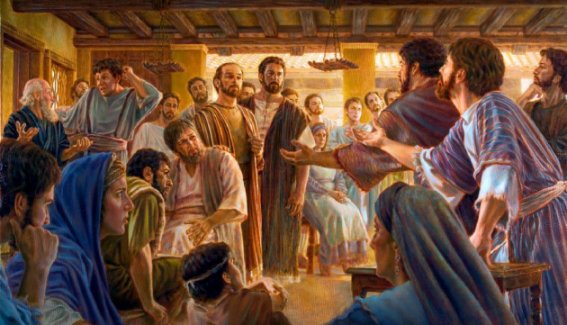 Barnabas and Paul become estranged over John Mark
Barnabas and Paul become estranged over John Mark
Paul and Mark are Reconciled
At any rate, the breach was not evidently healed even by the time of the Council of Jerusalem some three to four years later. Soon after that event, when Barnabas proposed to take Mark on another missionary journey, Paul refused, and so the two friends - Paul and Barnabas - parted unhappily, with Mark accompanying Barnabas to Cyprus (Ac.15:37). Ultimately, as we know, the breach between Mark and Paul was healed and Paul speaks of the younger man in affectionate terms as a companion and fellow-labourer in the Gospel (Phil.24; Col.4:10), and a few years later, shortly before his death in 66 AD, telling Timothy to "get Mark and bring him with you, for he is useful to me for ministry" (2 Tim.4:11, NKJV). By that time there would have been no doubt as to who had the higher authority.
Mark as Latin and Greek Interpreter for Peter
But it is as Peter's companion that Mark is best known. According to the unnamed apostolic elder I mentioned earlier, Mark became the 'interpreter' of Peter, probably after Paul had been released following his first imprisonment. Now it seems highly likely that the ex-fisherman Peter was not a very good Greek or Latin scholar and if he preached in Aramaic, as is almost certain, he required someone to translate his sermons clause by clause into Greek or Latin, as well as to conduct correspondence for him in those languages. That is how Mark came to know the Besorah (Gospel) so well and why I suggested last time and earlier that the Gospel of Mark is essentially a regurgitation of Peter's sermons and memoirs. This is confirmed by Peter in his first epistle, which was written at Rome (euphemistically referred to as 'Babylon' doubtless for political reasons), when he referred to Mark as his 'son' (1 Pet.5:13). This obviously makes Mark's Gospel a highly reliable account and therefore of the greatest value to us.
Mark in Egyptian Alexandria
We don't know what happened to John Mark after Peter's martyrdom in 67 AD, a year after Paul's beheading in Rome. Tradition makes him the founder and first bishop of the important assembly at the great metropolis of Alexandria in Egypt, a not unimportant place as it was regarded as the cultural capital of the known world, not least because of its fabulous library which nine centuries later, in 933, the Moslem invaders would burn to the ground. It was full of Egyptians, Greeks, Jews, Romans, Ethiopians, Nubians and other races, so it was a perfect location for a polylinguist like Mark who arrived around 45-49 AD! Perhaps if we have time later we can take a look at that fascinating story because this was the era when the Greek and Egyptian religions were fusing together under a single idol god called 'Sirabis', which is the same kind of syncretistic tendency of our modern age too with the rise of a New World Religion. Here Mark had been preceeded by the preaching of Apollo, an eloquent speaker mentioned in Acts 18:24-28, and possibly by others too like Simon of Cana and Theophilus who was close to Luke. We'll tie all these threads together later. At any rate, the Egyptian Copts have a lot of knowledge about Mark whom they describe as the first Patriarch of Egypt.
The Death of Mark
Mark is not spoken of as a martyr by any writer earlier than the 5th century so we don't know how he died, whether in Alexandria or elsewhere.
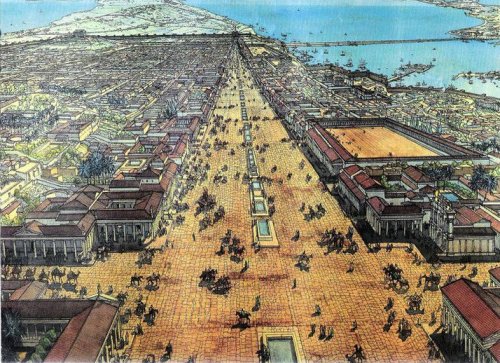 Alexandria, the great Egyptian cosmopolitan metropolis
Alexandria, the great Egyptian cosmopolitan metropolis
The Memoirs of Peter Unveiled
So welcome to the Memoirs of the Apostle Kefa or Peter by John Mark of Cyprus, a wealthy, well-educated Levite and polyglot, who likely became head of a very influential congregation in Alexandria. His authorship of this work has never seriously been disputed by anyone. In 130 AD Papias (60-163 AD), Bishop of Hierapolis (in modern-day Turkey), author of five books, and one of the important second generation post-apostolic fathers who knew the apostle John, wrote a lot about the Gospels and their origins (fragments of which survive only through Eusebius' writings) and said this about the Evangelist:
"Mark having become (or, having been) Peter's interpreter, wrote all that he remembered (or all that Peter related); though he did not [record] in order that which was said or done by Christ. For he neither heard the Master (Lord) nor followed Him; but subsequently, as I said, [attached himself] to Peter, who used to frame his teaching to meet the [immediate] wants [of his hearers]; and not as making a connected narrative of the Master's discourses. So Mark committed no error, as he wrote down some particulars just as he recalled them to mind. For he took heed to one thing - to omit none of the facts that he heard, and to state nothing falsely in [his narrative of] them."
Things to Remember
So please bear in mind the following things as we study the Gospel of Mark:
- 1. The events are not necessarily chronological (as in Dr.Luke's Gospel, for example, who was a very careful and meticulous historian indeed and wrote chronologically);
- 2. Mark's Gospel is, in essence, that of Peter, by which it was also known historically;
- 3. The audience was specifically Roman or Gentile who spoke in Latin or Greek - remember that Greek was the man language of the eastern part of the Roman Empire and Latin of the western part);
- 4. Mark writes in solemn Tanakk or Old Testament style like the Hebrew nevi'im (prophets) of old (more about that later);
- 5. The Gospel is hard-hitting and is action-centred, focussing on Yah'shua's (Jesus) miracles; and finally,
- 6. Mark's Gospel records three key events:
- a. The Raising of Jairus' Daughter;
- b. The Transfiguration; and
- c. The Agony in Gethsemane
at which only Peter, James, and John were present. James was soon martyred (Ac.12:2), John wrote an independent Gospel much later, so Peter alone was Mark's authority for these events and his is the first written account thereof.
Was Mark Written in Greek or Aramaic?
Some claim the Gospel of Mark was written in Greek, others in Aramaic. It doesn't really matter because it almost certainly would have been translated in either direction pretty quickly because of its importance as being authored by a key witness who, until John wrote his account about 30 years later, provided the only eye-witness account of some key events. However what Matthew and Luke reported was ultimately, however accurate, second-hand, and the original witness always carries more weight of authority. I believe that Aramaic and Greek examples of the Gospel would have been in circulation early on, with Mark doing the translation work himself. We don't have time to go into a discussion of that very interesting subject and it's not so important for our study just yet.
Conclusion
Next week we shall plunge straight into the text of Mark. If you would like to go over the first two chapters again, or plough on with the next ones, we shall be dealing with the specifics of the account hereafter. Yahweh bless you until next time, and have a really good study time, in Yah'shua's (Jesus') Name! Amen.
Continued in Part 3
Endnotes
[1] See N.T.Wright, The New Testament and the People of God (SPCK, London: 1992)
[2] See our Bible Versions website for more information on our preferences, and why
[3] The HS and ISRV are practically identical though I personally prefer the ISRV
[4] See Circumcision

 V118
V118
|


